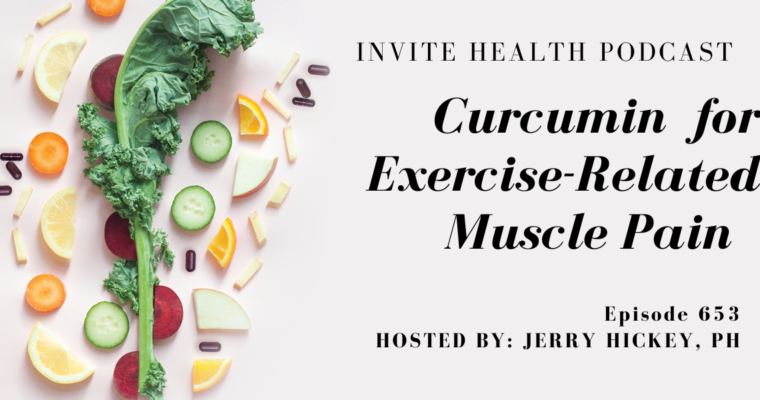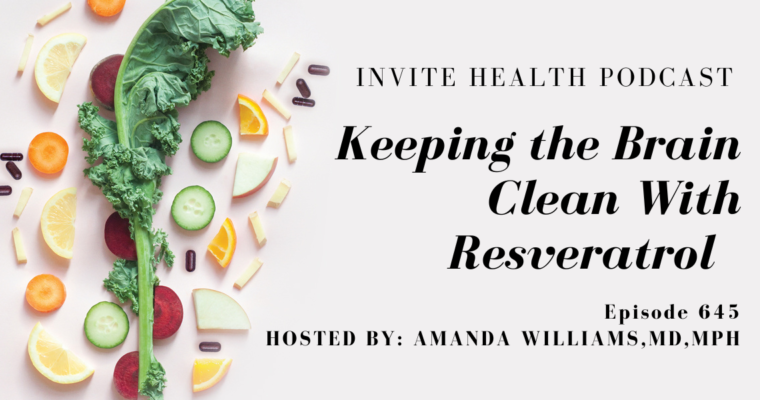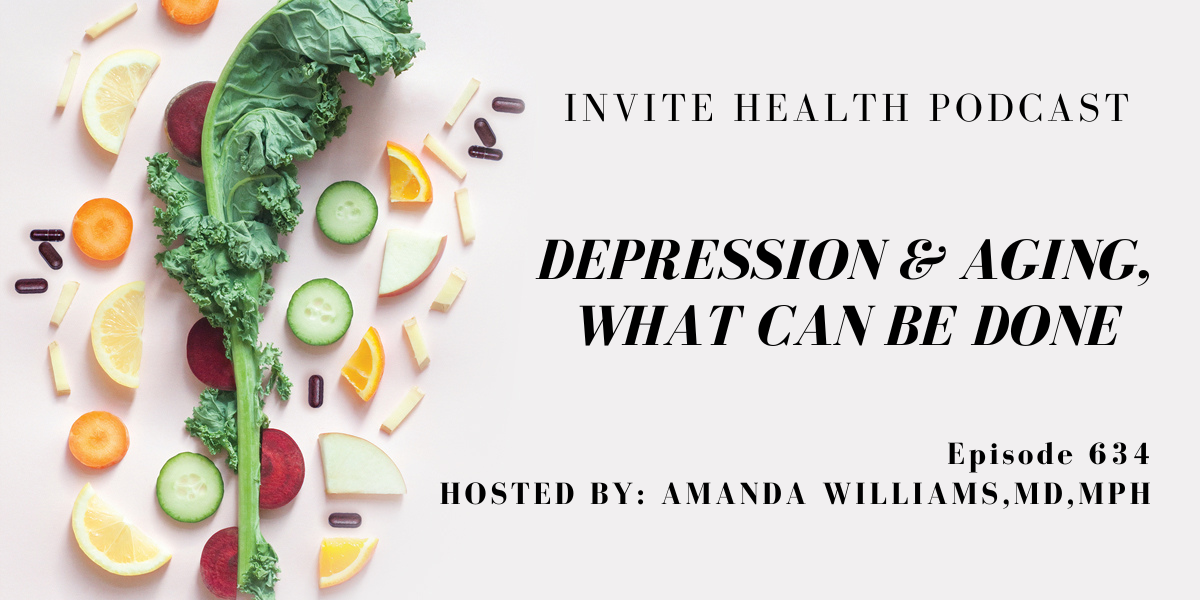Subscribe Today!
Please see below for a complete transcript of this episode.
DEPRESSION & AGING, WHAT CAN BE DONE, INVITEⓇ HEALTH PODCAST, EPISODE 634
Hosted by Amanda Williams, MD, MPH

*Intro Music*
InViteⓇ Health Podcast Intro: [00:00:04] Welcome to the InViteⓇ Health Podcast where our degreed health care professionals are excited to offer you the most important health and wellness information you need to make informed choices about your health. You can learn more about the products discussed in each of these episodes and all that Invite Health has to offer at invitehealth.com/podcast. First time customers can use promo code podcast at checkout for an additional 15% off your first purchase. Let’s get started. † [00:00:34]
*Intro Music*
Amanda Williams MD, MPH: [00:00:40] Understanding that millions of Americans deal with depression each and every single year, and it’s quite prevalent across all age groups. There’s a fascinating new study that is indicating that those who are older in age, who are dealing with depression are much more prone to aging, much faster. So, I want to talk about that today. And of course, some of the basic nutrients that you can be turning to, based on the science. To help offset that low mood environment that can age you faster. I am Dr. Amanda Williams, scientific director at Invite Health and researchers over at UConn. So, University of Connecticut, their Center on Aging, we’re looking at how adults who have depression are aging faster than their peers, who do not have depression. And how are they able to assess this? Well, they’re looking at the chromosomal abnormalities that occurs when we look at the shortening of the end caps of the telomeres. And we can see that longevity is certainly linked to cellular health. So biological aging, we know occurs, but there are things in different factors that can accelerate the aging process. So, we always look at chronic low-grade inflammation as being the main contributor to this, which is why I often talk about Inflammaging, it’s accelerated aging due to inflammation. We can see the negative effect that accelerated aging has on the human body. And we’re not just talking about the perceived signs of aging, such as wrinkles or gray hair. We’re talking about the biological pathways that are implicated in cellular aging. So as the cells get older, they begin to function differently, less efficiently, and they’re not acting the way that they did when they were more youthful. And when this happens, this creates inflammation. And this is what these researchers at UConn were zeroing in on, looking at these different participants who had clinically diagnosed depression and seeing how the influence of inflammation in the body was creating systemic problems. Cardiovascular risks were increased in these individuals, metabolic factors were increased in these individuals. So, we’re talking about greater likelihood of having high blood pressure, for example, looking at problems with blood sugar regulation and of course, their overall mood. So, when it came to just basic daily tasks, those who had higher levels of inflammation were aging much faster, which is a major problem, hence inflammaging. So, when we zeroed in on many of these different factors, we can look at how, you know, in proper stress management throughout our life can lead to this. We can certainly look at the lack of adequate nutrients from our diet can lead to this. And if you’re following a standard American diet, you’re at a much greater risk. And then we can look at the science as to how just the basic nutrients can create systemic balance for us. † [00:04:08]
[00:04:09] So we’ll zero in on omega threes. So, looking at things such as Fish oil or Krill Oil Advanced or for those who are vegetarian, looking at flax and the incorporation of these via supplementation on a daily basis, how much benefit that can actually create. In the molecular Psychiatry journal back in 2021, they looked at omega three supplementation and stress reactivity of cellular aging biomarkers, which is really great because what we’re talking about, how is it that our cells age faster and what impact in a positive way could omega three supplementation have for older individuals? They found that higher levels of omega threes were associated with longer telomeres, lower inflammation, and better regulation of the sympathetic nervous system lessening of cardiovascular risk. This was a randomized controlled trial examining the impact of omega three supplementation and cellular aging. And the way that they could assess this was through these different biomarkers, looking at levels of inflammation, and they could see how the omega three supplementation was helping to reduce excess cortisol, helping to lower inflammation, allowing the body to have better repair mechanisms, and hence could indicate that omega threes can slow that accelerated aging process as well as reduce depression risk. That in and of itself incredibly impressive. And we know that omega three fatty acids have always been linked to supporting the health of our brain, maintaining the overall volume of the brain as we get older. And the brain itself incredibly important, but yet very complex. And now that we see how the important influence that these key fats have on maintaining not only the structure but also the function of our brain is the reason why so many researchers have really zeroed in on omega three supplementation for brain health. The Journal of Nutrients, they go into detail on this, talking about how omega threes as far as diet, as well as supplementation, can help to create a more optimal environment to once again lessen inflammation. They’ve done direct studies giving individuals who have clinical depression omega three fatty acids. There was a meta-analysis that was conducted and published in the Translational Psychiatry Journal in 2019 where they assessed the impact from multiple double-blind placebo-controlled trials on omega three supplementation when it came to individuals who were diagnosed with depression. And what they found was that the omega threes had a significant beneficial effect on overall mood, lessening the depressive symptoms as well as lessening inflammation. So see how everything is going back to inflammation. So, this is an important thing. So, should you be taking your omega threes every day as you grow older? Yes, because we know it helps to regulate inflammation and it also has a positive effect on our brain aging. † [00:07:48]
YOU’RE OLDER, THINK ABOUT TAKING THESE SUPPLEMENTS – INVITEⓇ HEALTH PODCAST, EPISODE 620.>>LISTEN NOW
[00:07:49] We also know that B vitamins certainly can be incredibly beneficial. So that’s why if I’m dealing with someone who has a mood issue. Anxiety, depression, we always add in the methyl B, the biologically active form of those B vitamins. We can see how B vitamins have a critical, vital role in maintaining the function of the brain. And if we have inadequate exposure to these B vitamins from our diet, we’re not taking a comprehensive multivitamin that includes bioactive B vitamins. This can lead to problems such as anxiety and depression and, of course, heightened inflammation, because we know that B vitamins are key to how our body detoxifies, to our immune system regulation. And of course, having those B vitamins on board help to support healthy neurotransmitter release. Magnesium. Another simple way to address issues with depression. When you look at the magnesium status in depressed individuals, you will always see that their magnesium levels are low. In the Journal of Nutrition in 2017, they looked at this to look at the effect of magnesium supplementation on the depression status of individuals who had a co-morbid magnesium deficiency. So, you have individuals who are diagnosed with depression and at the same time they also have low magnesium in their system. And if they gave them magnesium supplementation, would this help, would this help with their depressive symptoms? And indeed, this is what they found, that once you resolve the magnesium deficiency, you get an improvement on overall cognitive function and mood. So, we look at individuals who are getting older in age and that maybe their diet is not a strong adherence to the Mediterranean style way of eating, maybe too many ultra processed foods, inadequate exposure to omega threes, magnesium, B vitamins. And you can start to draw this direct connection between heightened levels of neuroinflammation and overall systemic inflammation and a low mood environment. † [00:10:20]
[00:10:22] We can also look at another very important nutrient that has been directly linked to accelerated aging if we don’t have enough of it and depression and that’s acetyl- l-carnitine. We know that acetyl l-carnitine is a powerful modified amino acid that helps the body generate energy, helps to regulate stress, powerful antioxidant in its own right. In the Journal of Psycho Medicine Research, they looked at a meta-analysis. So multiple clinical trials assessing the impact of acetyl-l-carnitine supplementation on individuals who suffer from depression. We understand now, that, that dysregulation, the disruption of those fatty acids across the cell membrane in order to generate energy, in particular at the level of the brain cells is a direct causal reason for why many individuals experience depressive symptoms. And you could see that when they had stabilized their acetyl l-carnitine levels, those depressive symptoms began to diminish. So, when we see studies that tell us with aging comes depression, this isn’t always the case. If we can maintain adequate levels of just key nutrients, omega three fatty acids, magnesium, acetyl, l-carnitine B vitamins, we can do so much to support the brain. Help regulate inflammation and improve our overall aging process. So, keep that in mind the next time you ponder what it’s going to be like to grow a little older. It shouldn’t be a problem at all if you’re doing the right things. So, thank you so much for tuning in to the InViteⓇ Health Podcast. Remember, you can find all of our episodes for free wherever you listen to podcasts or by visiting invitehealth.com/podcast. Do make sure that you subscribe, and you leave us a review. You can follow us on Facebook, Twitter and Instagram, and we will see you next time for another episode of the InViteⓇ Health Podcast. † [00:10:22]
*Exit Music*










